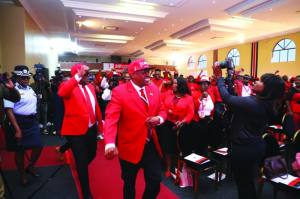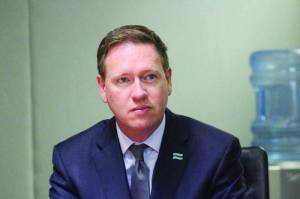I feel the urge to go further after my submissions to you of June 6, 2022, at Masunga. This arises from the realisation that most of the oral submissions before you have very little or nothing to do with the Constitution.
This may be an indication of how poor our education system is. For example, and I suspect, it may have something to do with not teaching our children the true history of their country.
Secondly, in some countries constitutions appear in the multiplicity of the languages spoken in those countries, which is not the case in this country, for obvious reasons.
I have realised, for example, that several people have submitted that the age of tandabala (pension age) be brought down from 65 to 60 years. With respect, this is not a constitutional matter; and there were several similar oral submissions brought forward before the Constitutional Review Commission. Secondly, a few oral submissions were on point but seemed to me to lack meat or did not go far enough, e.g. the submissions on the House of Chiefs and the outcry for equality of the tribes in this country.
In my honest opinion this country is governed the way it was during the British Protectorate days, with a few modifications. The major difference, of course, is that we now have a democratically elected Parliament which, however, is to an extent still dominated by the Tswana tribes. All else is like we are still in the British Protectorate days, sometimes worse.
By naming this country “Botswana” and making the Setswana language constitutionally the national language; and going further, administratively or politically, to declare Setswana the only language teachable throughout the country, there is no question that Seretse Khama, in complicity with the British, wanted to perpetually subjugate to extinction, linguistically at least, all non-Tswana tribes (sub-tribes) to the Tswana tribes, which is a clear relic of the colonial past.
Anyone with knowledge of the history of this country, which Seretse and the British clearly had, would have, at that time, known how this country was made up or how many other tribes in the country would have had an interest in the outcome of the talks at Marlborough; and would, accordingly and quickly, have seen and appreciated Matante’s point of view and agreed that those talks needed to be postponed for proper consultation with all the people of Bechuanaland.
But their prejudice blinded them into continuing with the colonisation of their fellow countrymen (the so-called sub- tribes) which had been going on since 1899, if not, 1885.
Clearly, Seretse Khama’s approach was to adopt wholeheartedly the British notion that Batswana were more important, for whatever reason, than, or were somehow senior to, the other inhabitants of this country.
This is precisely where we are today. But the question is, one may ask, why should having been here first, or being more important than the others from the British perspective, matter so much? After all we were all here in 1966 and years or centuries before, and should have, in my view, marched together into Independence as equals with no bigotry on any of us.
On the contrary however, the Tswana chiefs, having acquired land to themselves and their respective tribes, were overloads over all non-Tswana tribes in their so designated territories, as I said in my previous submission; and not only were they so placed above the non-Tswana tribes, they were elevated further to membership of the Legislative Council (formerly the Native Legislative Council) sitting in Mafikeng and chaired by the Resident Commissioner; and with the Resident Commissioner in the chair they made laws and decided on other matters for the whole of the Bechuanaland territory. Thus they became more powerful even over the chiefs of the other tribes.
This state of affairs was carried over into Independence on 30th September, 1966 with very little change, if any. Hence at Independence the Tswana chiefs became the ex-officio members of the House of Chiefs, now Ntlo ya Dikgosi following the Balopi Commission, and they still have, to this day, enormous powers over the non-Tswana tribes and their chiefs in their respective districts.
The other tribal chiefs, characterised as sub-chiefs, from the non-Tswana Districts of Chobe, North East (Tati), Gantsi and Kgalagadi, have to find their way to the House of Chiefs by way of election by their colleagues in their respective districts, one from each district, and are obliged to know Setswana as a condition for membership of the House of Chiefs. For example, in the Tati District there were/are five such chiefs, who had/have to come together and elect one of them to go to the House of Chiefs, now Ntlo ya Dikgosi, for five years. In contrast, the Tswana chiefs are there forever or permanently.
I am not unaware that since the Balopi Commission additional members have been introduced into the House of Chiefs as follows: 5 persons to be appointed by the President, and up to 20 more to be elected from selected regions, as per the Second Schedule to the Constitution, subject to a minimum of 33 and not more than 35 members of the House of Chiefs, in total.
The Balopi Commission followed similar complaints, specifically about why the Tswana tribes were elevated to “Principal Tribes” in the Constitution. This was as a result of a Parliamentary motion by Hon Oliphant Mfa, MP as he then was around 1997. The Balopi Commission however, side-stepped the issue and as a result only cosmetic amendments were made to the Constitution; and the Tswana tribes, in practice, remain “principal” even without that word in the Constitution.
The Commission merely changed the word ‘chief’ to the Tswana equivalent ‘kgosi’, and increased the membership of the House without reducing the powers of the Tswana chiefs and their tribes over other tribes; hence ‘Ntlo ya Dikgosi’, which simply means ‘the House of Chiefs’.
Why it was found necessary to do this apparently meaningless translation is anyone’s guess. No doubt, the whole exercise of the Balopi Commission was a bluff of extremity. If I may illustrate, the so called Bamangwato Kgosikgolo (Paramount Chief) continues to be Paramount Chief over Bakalanga chiefs at Maitengwe, at Tutume and the surrounding villages of Madandume (Magapatona), Tjilagwane (Selolwane), Nkange and Senete, and at the villages of Nswazwi, Nshakazhogwe, Tjizwina (Sebina), Mathangwane, Chadibe, Gweta, Rakops and other villages, apart from Serowe, the capital; and over Babirwa chiefs at Bobonong, Tobane, Semolale, Kobojango, Mathathane, Molaladau (Molalatau) and other villages in Bobirwa; and over Batswapong chiefs at Lerala, Machaneng, Ratholo, Mogapi, Mogapinyana, Goo-Sekgweng, Seolwane and other villages in the Tswapong area.
The Batawana Chief is still Paramount Chief over all the chiefs of Bayeyi, Bambukushu, Basubiya, Baherero, etc., in the Batawana District. The Ngwaketse and Kweneng Paramount Chiefs have similar arrangements under them in that they continue to be overloads over other tribes in their respective territories, which date back to the protectorate days as well.
So basically, nothing has changed as already pointed out; and we continue to be sub-tribes (meratshwana) on our land arbitrarily given to the Tswana tribes under British Protection and we have been under Tswana rule for more than 55 years now since Independence. Hence the loud public outcry to the Constitutional Review Commission for tribal equality and land distribution to all the tribes of this country without distinction; and that there should be equality also in the membership to the House of Chiefs, now manipulatively called Ntlo ya Dikgosi for assimilation purposes. In other words, the public outcry is for the dismantling of the Tswana paramount chieftaincy structures, to enable other tribes to be free to rule themselves within the Independent State.
In these circumstances there can be no question at all that British Protection was for Batswana only, while the non-Tswana or the sub tribes were, from 1885 until Independence, colonized by Batswana under British supervision. Tswana colonialism has however continued, as it was meant to, after the British were gone, as I have shown throughout my submissions herein.
In short we still are colonised by Batswana, hence the programme of assimilation continues relentlessly, ruthlessly and uninterrupted. At the risk of repetition, wrongly designating this country Bechuanaland or the land of Batswana by the British, was not only historically misleading but it elevated Batswana above the other inhabitants of this country, and made them arrogantly believe, as they do today, that they were/are exclusively the owners of this country; and the so-called sub-tribes would remain forever under their rule to their extinction by means of assimilation, which started during the Bechuanaland Protectorate days. P.G.
Matante would have timely corrected or terminated this practice or notion at the Marlborough Constitutional Conference in February, 1966, but his proposals, as said before, were rejected by his fellow Tswana tribesmen Seretse Khama, Ketumile Quett Masire and Bathoen Gaseitsiwe, no doubt, in complicity with the British Establishment.
At that time and before, Bechuanaland was probably the poorest country in Africa, with dusty roads all over; the literacy rate was at bottom level too and there were very few educated people, less still graduates; and such as there were, were employed either as Civil Servants or they were working in some capacities elsewhere in Africa or abroad.
Matante had the political education while Seretse Khama was a graduate, I am told, with a law degree; so there was virtually no one else to challenge him (Seretse); some people (ordinary people including BDP members) in the country were alarmed too at the stand taken by Seretse Khama and his associates at Independence, but were unable to do anything.
Accordingly, if we must chart the way forward to a life of peace, equality and mutual respect, we will need to go back to the drawing board. That means we must come together in our mutual interest and decide what’s best for our beloved country. Short of that we are likely to have a future of strife for equal rights without end. I say so because Batswana generally adamantly believe, wrongly of course, that they own this country and Setswana is the only language of this country, period. They believe or have been made to believe that we all found them here and we must be treated for what we are – migrants. This attitude will have to change.
Finally, I need to point out that we are where we are, almost 56 years after Independence, mainly because of our docility as the exploited and deprived people of this country; but I am confident this will not continue for ever. The British really messed us up and it is a pity that some of us have decided to stick tenaciously to that mess at Independence and thereafter. The notorious British “divide-and-rule” policy was at full play here; that is to say, it was aggressively, openly and shamelessly being implemented in this country; and if you are in any doubt at all, you need to be reminded of what happened to John Nswazwi who tried to challenge it during the regency of Tshekedi Khama of the Bamangwato.
It is however, necessary to add as a warning, that any constitution, anywhere, that permits or harbours such glaring tribal inequalities as ours, is an insult and not worth keeping in this day and age.
JOHN MOSOJANE* is a retired High Court judge







